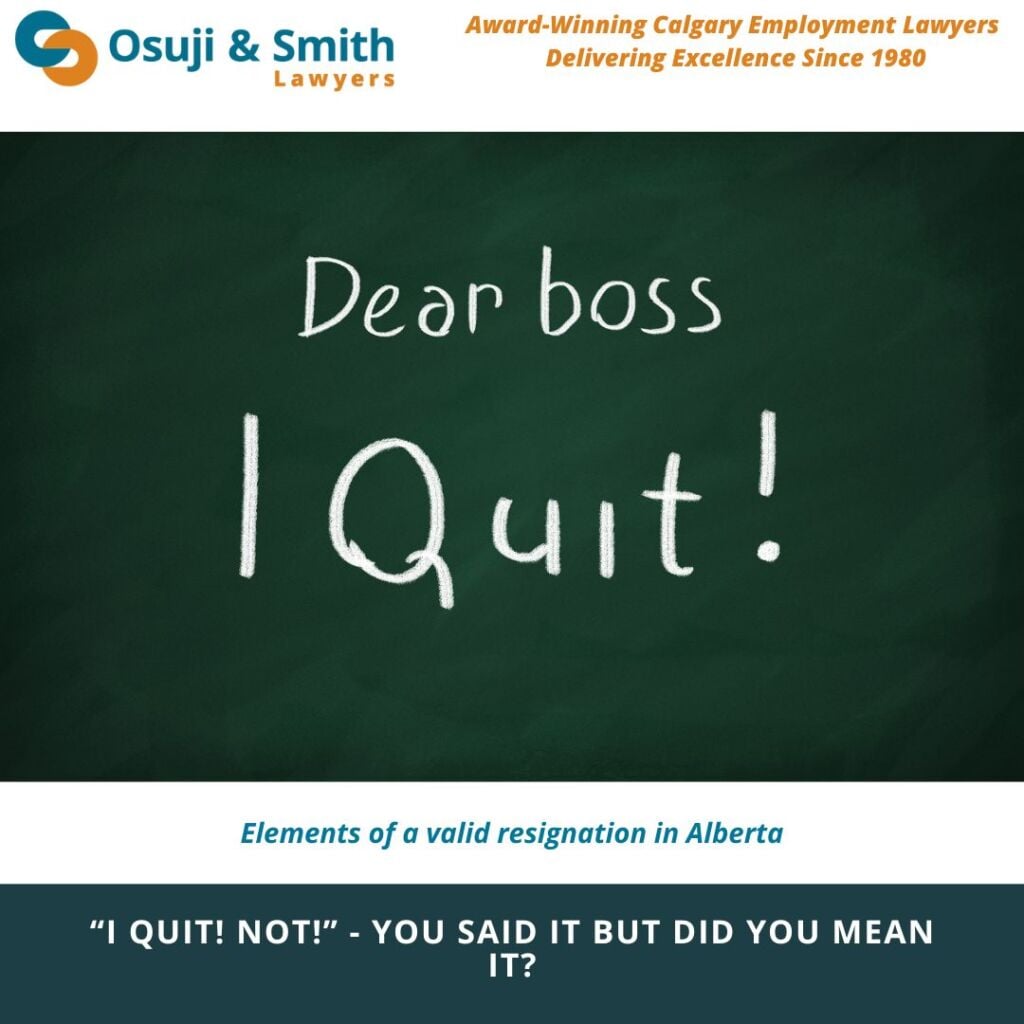“I QUIT! Not!”- You said it but did you mean it? ELEMENTS OF A VALID RESIGNATION IN ALBERTA
Okay, let’s paint a picture.
You have been very frustrated with your job lately. Working long hours, late nights, barely any support from coworkers and employer. The pay is quite good though and so are the benefits, so you stay.
One night, your employer calls you to cover a shift the next day. You have already done a 12 hour shift today and have been working 5 days straight without a break.
In the heat of the moment, you get upset with your employer on the phone and say the infamous words “I QUIT!” Shortly thereafter, you receive an email confirming your resignation. You panic and don’t know what to do.
In such circumstances, is your resignation valid? The answer is, as any lawyer would say, “it depends”.
Both employers and employees have the right to terminate the employment relationship. When an employer ends the relationship, it is a termination. When an employee ends the relationship, it is called a resignation.
But what happens when an employee resigns in the heat of the moment and later regrets it? Can he or she take back that resignation? There is plenty of literature in Employment Law which can help resolve this issue.
Employment Law in Canada, 4th edition, 2005, states,

“The courts have held that a valid resignation must have a subjective as well as an objective component. The former requires conduct on the employee’s part that unequivocally manifests that he or she had the subjective intention of quitting. The latter requires conduct on the employee’s part that would lead a reasonable person in the position of the employer to believe that the employee has carried out his or her subjective intention.” (Employment Law in Canada, 4th ed., looseleaf, (Markham: LexisNexis, 2005), c. 13, by Geoffrey England and Innis Christie and Peter Barnacle)
The Alberta Court of Queen’s Bench in Carroll v Purcee Industrial Controls Ltd, 2017 ABQB 211 [Carroll], recognized, that any effective and binding resignation must be clear and unequivocal. The Court in Carroll also stated that in order for the courts to determine whether an employee had resigned, they would apply a subjective and objective test: “subjectively, did the employee intend to resign; and objectively, viewing all the circumstances, would a reasonable employer have understood that the employee had resigned”.
Additionally, Justice Metzger in Kirby v. Amalgamated Income Ltd. Partnership, 2009 BCSC 1044 (B.C. S.C.), stated that “an employee may revoke an offer of resignation before it is accepted, particularly so if the offer is made in the heat of the moment”.
Therefore, the circumstances surrounding the resignation should be taken into account subjectively and objectively. In the example mentioned above, if the person had clarified, or revoked her resignation, prior to receiving the confirmation email from the employer, she would not have been deemed to have quit.
However, objectively, her resignation was clear and unequivocal. There was no room for interpretation here. Therefore, she is deemed to have quit.
When an employee resigns, an employer should confirm the resignation, confirm all outstanding payments to be made, for example, wages for completed work and unused vacation days and make arrangements for return of all company property in the employee’s possession.
Therefore, be very careful when using the words “I Quit”. You wouldn’t want to say it if you don’t mean it!
Please CONTACT OSUJI & SMITH CALGARY EMPLOYMENT LAWYERS for ANY OF YOUR EMPLOYMENT MATTERS.
Author: Ayendrila Sharma

